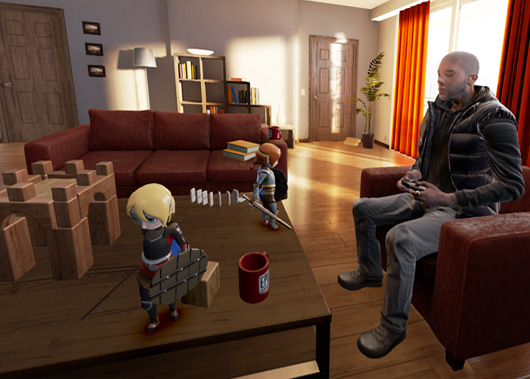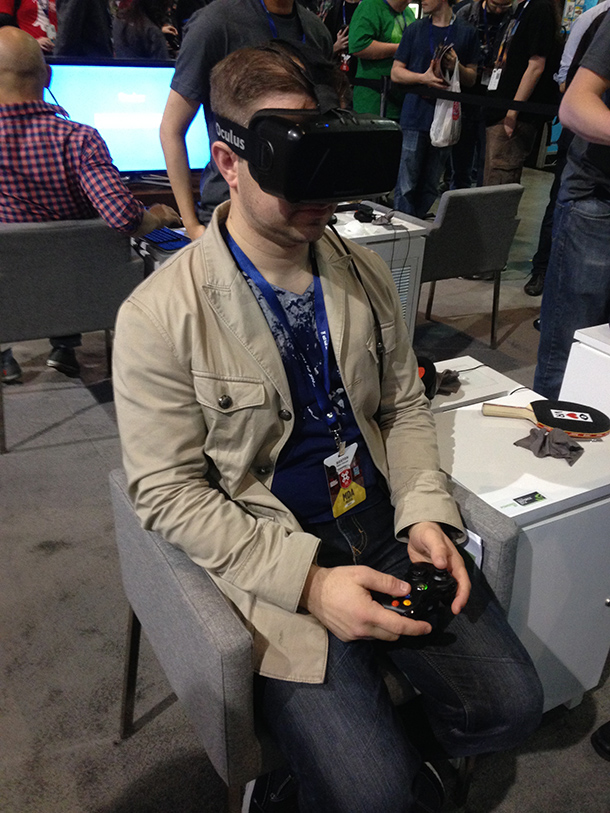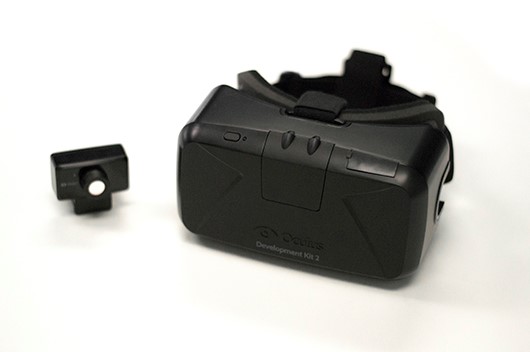
I’m sitting in a modern living room of an apartment, staring at a flat screen hanging on the wall. The light from the windows behind me cascades onto the floor and walls. Orange couches surround a coffee table, with a pair of toy knights standing on top. I turn to my left to see my opponent also looking around the room before he settles his eyes on me. There’s no wave, no head nod, just the quiet acknowledgement that we’re about to do something.
“Okay, here’s how to play,” says a disembodied voice over my shoulder. I turn my head, but all I see is the window again. An explanation of game controls ensues, causing me to look down at the PC gamepad in my hands. I’m fidgety to begin whatever it is I’ll be doing, and before the explanation ends I begin pushing buttons. The toy knight on the right jumps, knocking over blocks on the table.
“Oh, okay. You got it. Have fun!” the voice says. I look at my opponent. I look at the table. I look at the knights. Our dance begins.
The experience is called Couch Knights. It’s not so much a game as it is a tech demo, made by Epic Games to showcase their latest build of Unreal Engine 4. There are no knights in front of me, no coffee table, and no sunny windows casting afternoon light. There is no spoon. I’m in the middle of a noisy PAX East conference center, wearing the latest iteration of the Oculus Rift virtual reality headset.
For many people, this will be their first time trying the virtual reality device. From its humble yet show-stealing appearance at E3 last year, to the latest injection of funding, the opportunities to try our the hardware have been growing exponentially. The only way to fully understand it is to try it, and according to Oculus that’s exactly why they’re bringing it to as many trade shows as possible.

My demo with Couch Knights at PAX East was brief, but shows the potential that founder Palmer Luckey and co. envisioned: virtual reality isn’t just about games, but about experiences. That translates into what they feel is the real reason the Oculus exists.
“Hardware is just validation. It’s what experiences developers create that really tell the VR story.” The Oculus team at PAX explains everything to us with a visible metric ton of passion. It’s not PR talk, either, as they repeatedly tells us that “we’re not doing press, we’re just here showing the next build to fans.”
But there is a company mantra, and that’s that experiences, especially novel ones, trump whatever the hardware is that they’re on. That’s why the actual hardware on display in their booth isn’t showing FPS shooters and just one racing game. Couch Knights isn’t typical; it shifts the focus of the experience away from being “in the game” to being “in the environment, playing the game.” It didn’t matter that it was knights on the table — it could have been frogs or bananas. The point of the experience wasn’t the game. I paid more attention to my surroundings and my opponent than I did the action (which was absolutely mundane to control, truth be told).
At one point, I hopped my knight onto the lap of my opponent, swinging my sword and launching fireballs at his belly. I then tried to destroy the table (nope — didn’t work) and to play a game of hide & seek around the couches. I even ran over to the window and do a celebratory pose. Everything but play the game as a fighter.
“Sorry, I think I’m playing it wrong,” I say.
“Nope! You can do what you want. Break the rules, if you can. That’s the fun part.”

It’s hard not to come away as a fan, something that even developers are experiencing. That’s perhaps why the company choses to emphasize their involvement with indie games, make the SDK free, develop a best practices guide, and are planning another VR jam for after Dev Kit 2’s release.
“Establish the rules, know the rules, break the rules.” That’s the constant for Oculus games and for their development.
I also lost the match 3 games to none, but I’ve wiped that from my memory. I’ve also preordered the IKEA lounge chair I was virtually sitting in.
Images: Oculus, SideQuesting

No Comments